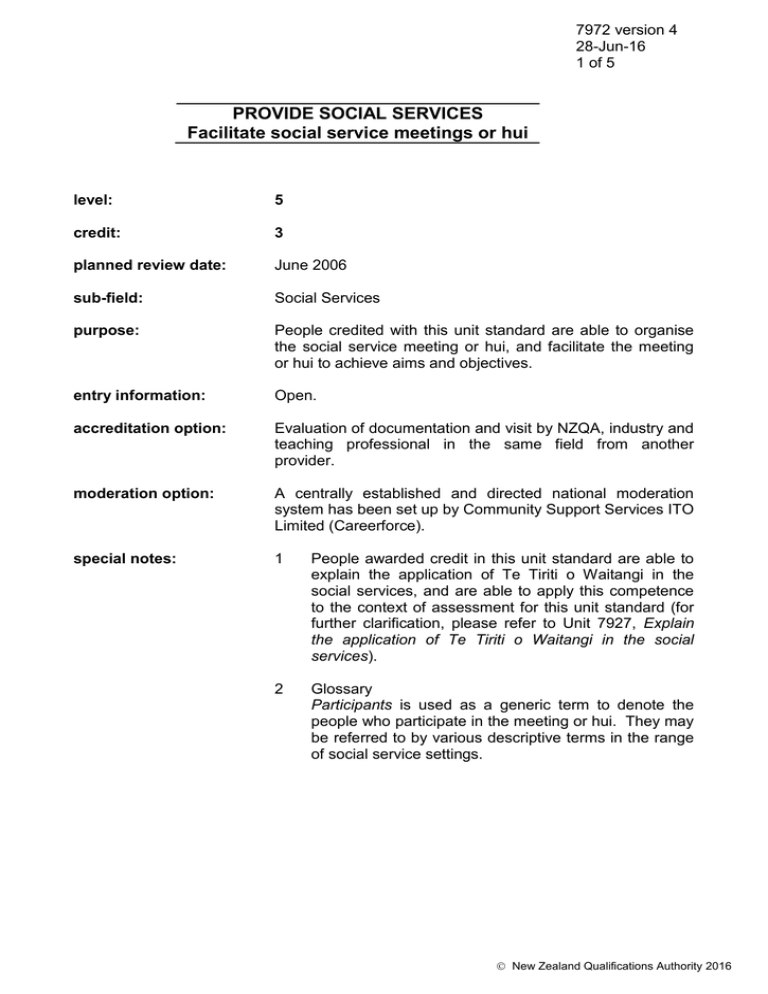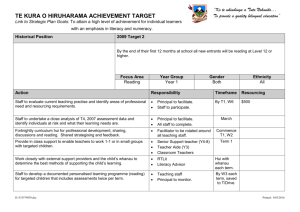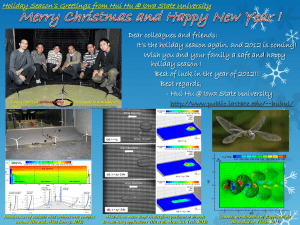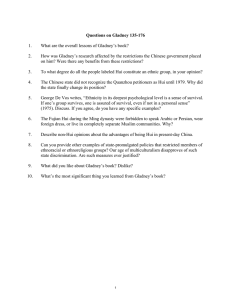PROVIDE SOCIAL SERVICES Facilitate social service meetings or hui
advertisement

7972 version 4 28-Jun-16 1 of 5 PROVIDE SOCIAL SERVICES Facilitate social service meetings or hui level: 5 credit: 3 planned review date: June 2006 sub-field: Social Services purpose: People credited with this unit standard are able to organise the social service meeting or hui, and facilitate the meeting or hui to achieve aims and objectives. entry information: Open. accreditation option: Evaluation of documentation and visit by NZQA, industry and teaching professional in the same field from another provider. moderation option: A centrally established and directed national moderation system has been set up by Community Support Services ITO Limited (Careerforce). special notes: 1 People awarded credit in this unit standard are able to explain the application of Te Tiriti o Waitangi in the social services, and are able to apply this competence to the context of assessment for this unit standard (for further clarification, please refer to Unit 7927, Explain the application of Te Tiriti o Waitangi in the social services). 2 Glossary Participants is used as a generic term to denote the people who participate in the meeting or hui. They may be referred to by various descriptive terms in the range of social service settings. New Zealand Qualifications Authority 2016 7972 version 4 28-Jun-16 2 of 5 PROVIDE SOCIAL SERVICES Facilitate social service meetings or hui Participant characteristics may include but are not limited to: physical, spiritual, and mental characteristics, including age and stage of development, culture, disability, gender, health status, language, sexual orientation. Participant needs may include but are not limited to: needs to be respected, affirmed and supported; needs for physical comfort, safety, and privacy. 3 Some social service workers facilitate meetings under statutory authority. It is not essential for people credited with this unit standard to know all of this legislation. Relevant legislation may include but is not limited to: Adoption Act 1955, Children, Young Persons and Their Families Act 1989, Family Proceedings Act 1980, Guardianship Act 1968, Mental Health (Compulsory Assessment and Treatment) Act 1992, Protection of Personal and Property Rights Act 1988. 4 People awarded this unit standard are able to demonstrate and self-monitor their ability to relate to difference, as evidenced by acknowledgement and respect for difference, acceptance, genuineness, honesty, humility, patience, and warmth. They respond in inclusive ways that are appropriate to the characteristics and needs of participants. Participant characteristics and needs include their age and stage of development, culture, disability, gender, health status, language, sexual orientation, and needs for physical comfort, safety, and privacy. People awarded this unit standard demonstrate clarity about the limits of their role, function, and competence, and when to refer on to others. New Zealand Qualifications Authority 2016 7972 version 4 28-Jun-16 3 of 5 PROVIDE SOCIAL SERVICES Facilitate social service meetings or hui 5 All communications are treated confidentially. The scope and limits of confidentiality are defined through negotiation and informed consent, and criteria established by legislation, ethical practice, and service provider guidelines. In the context of this unit standard, sources of criteria established by legislation, ethical practice, and service provider guidelines include but are not limited to: Official Information Act 1982, Privacy Act 1993, service provider codes of conduct, codes of practice issued by the Privacy Commissioner, social service codes of ethics, and service provider guidelines, protocols, staff manuals, strategic plans, kawa, or tikanga. 6 People awarded credit in this unit standard show that their actions are guided and supported by valid theory for social service practice. Evidence is required of social service theory that is derived from authoritative sources, which may include but are not limited to: body of knowledge related to social service work; cultural theory; practice research. Elements and Performance Criteria element 1 Organise the social service meeting or hui. performance criteria 1.1 The style of meeting or hui is established according to the proposed aims and objectives of the meeting and the advantages and disadvantages of the different meeting or hui styles. Range: style of meeting or hui may include but is not limited to - formal meeting, informal meeting, in-house meeting, public meeting; proposed aims and objectives of the meeting may include but are not limited to - statutory requirements, nature of the decisions required, authority required for decisions, emergency or nonemergency situation. New Zealand Qualifications Authority 2016 7972 version 4 28-Jun-16 4 of 5 PROVIDE SOCIAL SERVICES Facilitate social service meetings or hui 1.2 Proposed participants in the meeting or hui are identified according to the aims and objectives of the meeting or hui. 1.3 The venue and protocol or kawa for the meeting or hui is selected according to the characteristics and needs of participants. 1.4 Notifications and invitations to participants are in accord with conventions for the style of meeting or hui, and cover all essential details. Range: 1.5 essential details include but are not limited to - time, date, venue, resources available to assist attendance, aims and objectives, agenda. Organisation ensures the identification and co-ordination of the resources that are necessary to support the welcome and hosting of the participants. Range: resources may include but are not limited to - kai, kaikōrero, kaikaranga, waiata, ringawera. element 2 Facilitate the meeting or hui to achieve aims and objectives. performance criteria 2.1 The planned kawa or protocol for the welcome or mihi is applied according to the needs and characteristics of those participants who attend the meeting or hui. 2.2 Meeting or hui conventions are applied throughout the meeting according to the style of meeting or hui. Range: 2.3 Roles within the meeting or hui are established. Range: 2.4 conventions may include but are not limited to – mihi, karakia, kōrero, confirmation of the agenda, confirmation of aims and objectives, apologies, mode of decision making, recording. roles within the meeting or hui may include but are not limited to leadership, record keeping. Facilitation methods and skills acknowledge the characteristics and needs of participants, acknowledge verbal and non-verbal communications, and are New Zealand Qualifications Authority 2016 7972 version 4 28-Jun-16 5 of 5 PROVIDE SOCIAL SERVICES Facilitate social service meetings or hui matched to the style of meeting or hui, aims and objectives of the meeting or hui, and relationships between participants. Range: facilitation methods and skills may include but are not limited to vocabulary, content, and structure of language; articulation, voice modulation, and projection; attending, listening, following, clarifying, encouraging, questioning, paraphrasing, reflection of feeling and content, summarising, 2.5 Facilitation strategies focus participants on the agenda of the meeting or hui and promote movement towards consensus on matters under discussion. 2.6 Facilitation strategies are directed towards constructive use of the time available to complete the agenda. 2.7 Facilitation strategies are directed towards achieving constructive resolution of any conflict between participants. 2.8 Facilitation ensures that decisions come from the participants rather than the facilitator. 2.9 Facilitation of closure of the meeting or hui is according to kawa or protocol. Comments to: Careerforce PO Box 2637 Wellington 6140 Please Note: Providers must be accredited by the Qualifications Authority before they can offer programmes of education and training assessed against unit standards. Accredited providers assessing against unit standards must engage with the moderation system that applies to those unit standards. [Please refer to relevant Plan ref: 0222] New Zealand Qualifications Authority 2016




